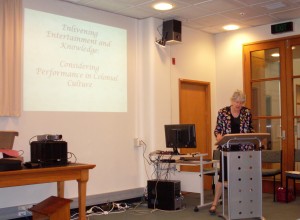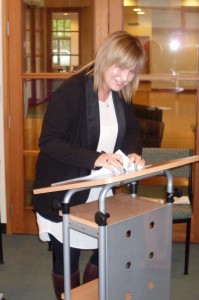W.H. Oliver Lecture at Palmerston North
Our Centre Director, Professor Tony Ballantyne, will be giving the W.H. Oliver Lecture for 2014. This event is held annually at Massey University, Palmerston North in honour of the eminent New Zealand historian, Professor Bill Oliver. Click here for further details of this public lecture.
Cowan Symposium Call-for-Papers
Call for Papers
New Perspectives on James Cowan
A One-Day Symposium
Centre for Research on Colonial Culture and the Alexander Turnbull Library
National Library, Wellington, 21 February 2014
James Cowan is best known for his official history of the New Zealand Wars, but his significance for the production and circulation of knowledge about Māori in the late colonial era covered a broad range of subjects. Alan Mulgan wrote after Cowan’s death in 1943 that more than anyone else, he had ‘shown us how to think as New Zealanders’. Mulgan signaled here not only Cowan’s prolific writing, but also his cross-cultural engagement from the 1890s to the 1940s. He was himself a figure of the type he so admired: the cultural go-between. Although his work often purveys the racial ideologies of his time, Cowan’s early use of oral historical methods, and familiarity with a wide range of Māori informants, effected the transition to print of much that would not otherwise have been circulated in Pākehā contexts, or recorded in print.
Cowan’s reputation has fluctuated in response to shifts in cultural politics, writing and historiography. His work began to attract contemporary scholarly attention with an article by Chris Hilliard in NZJH in 1997. Stories of the New Zealand Bush has been republished recently with a critical introduction by Alex Calder. The Adventures of Kimble Bent was read on National Radio in 2011, and re-written as a graphic novel, and film-makers have drawn on his work over decades. Some dimensions of Cowan’s work invite closer study: his significance for iwi history, his photographic collection, and the personal life of this particularly colonial figure, for example, would repay investigation.
For this one-day event, we invite papers which evaluate Cowan’s contribution to colonial encounter and colonial memory from a wide range of perspectives.
Please send abstracts (up to 250 words) and a bio (up to 100 words) in a Word attachment, by 30 September 2013.
Abstracts and enquiries should be sent to: cowan.symposium@otago.ac.nz
Further information about the symposium will be forthcoming.
Associate Professor Chris Hilliard, University of Sydney, will give a concluding commentary.
Convenors
Annabel Cooper (Centre for Research on Colonial Culture, U of Otago)
Ariana Tikao (Research Librarian, Māori, Alexander Turnbull Library),
CFP: New Zealand Historical Association Conference
The biennial New Zealand Historical Association conference is being held in Dunedin from Wednesday 20 November until Friday 22 November.
Keynote Speakers are:
PhD Scholarship Available: History of Eugenics in New Zealand
Associate Professor John Stenhouse (History & Art History) & Professor Hamish Spencer (Zoology) are looking for a suitably qualified student to research and write a PhD thesis on the history of eugenics in New Zealand.
The successful applicant will have a BA Hons or MA in history, preferably with First Class Honours. Some training in the history of science is desirable but not essential.
This project aims to illuminate what, if anything, was distinctive about the New Zealand eugenics movement by placing it in comparative international context.
The successful applicant must be willing to investigate the interconnections between eugenics and science, class, race, gender, nation-state and religion. This three-year project is funded by the Allan Wilson Centre for Molecular Ecology and Evolution and includes a $25,000 NZD per year scholarship, $5,000 per year for tuition fees, and funding for international travel.
To apply for this position submit a CV, academic record, two academic references, a writing sample, and a short statement of research interests to John Stenhouse: john.stenhouse@otago.ac.nz
Presenters Perform
A very successful symposium on Colonial Performance was held at the Hocken Collections Seminar Room on Monday, November 19th. Presenters gave illuminating talks on a wide range of colonial performances from Irish drama in Dunedin, to Maori performers in Manhattan, to the theatre of the Dunedin police court, among other topics.
Barbara Brookes, who convened the day-long symposium, kicked off the event with a discussion of touring medical lecturer Dr. Anna Longshore Potts.
Barbara was followed by two presentations on the theatre scene in Dunedin. Lisa Warrington invited us into Dunedin’s first theatre, a converted horse stable, and Peter Kuch drew attention to the importance of Irish drama in the development of Dunedin theatre during the 1860s. Kirstine Moffatt entertained us all with stories about the amateur pianist, who appeared in private homes, at concerts held in church halls, and barns.
Unlike Richard John Seddon, who spoke for hours at a time, Tom Brooking used a mere 20 minutes to describe the role of performance in colonial politics. At the same time he revealed some of the popular prejudices against Seddon in New Zealand’s historiography. Rosi Crane drew upon her doctoral research in the history of science to show how university professors used their role as public intellectuals to advance scientific understanding, for example in the field of evolution.
Bronwyn Dalley gave a vivid account of the many re-inventions of ‘urban investigator’, free-thinker and spiritualist, Lotti Wilmott in 1880s Christchurch. The tensions between ethnographic ideas about race and “primitive” societies were put to the test by the appearance of Maori performers at New York City’s Hippodrome in 1909-10. Marianne Schultz, from Auckland University, also explored how the leaders of the US suffragette movement used the case of Maori women, who had the right to vote, in their own campaigns for enfranchisement. Michelle Willyams also looked at Maori performers and performance, highlighting the hybrid nature of the musical repertoire developed by Reverend Seamer’s Waiata Maori Choir in the 1920s and 1930s.
University of Otago MA student Fabia Fox walked us through the streets of nineteenth-century Dunedin, and into the backyards of homes in the ‘Devil’s Half-Acre’ famous for its criminal underclass. Their exploits were often played out in the Dunedin police court, and relayed to a voyeuristic reading public through the column of the court reporter. In contrast, John Stenhouse embellished his talk on the Rev. Rutherford Waddell with his own rendition of excerpts from his famous sermon on the sin of cheapness. Prof. Lyn Tribble (English) eloquently wrapped up the day, drawing together the various themes into what she described as an ecology of performance.
Webs of Empire
Tony’s Ballantyne’s new book, Webs of Empire, is capturing the attention of New Zealand media. Listen to Tony talk about his new book on Waatea News to find out how Gore and Chicago are connected, the important links between Māori and Asia, and the processes and practices of colonial knowledge production.
Colonial Performances Abstracts
A feast of enticing papers are on offer at the Colonial Performances Symposium, which takes place at the Hocken Collections on Monday November 19th.
Feel free to read the Abstracts, which are now available.



